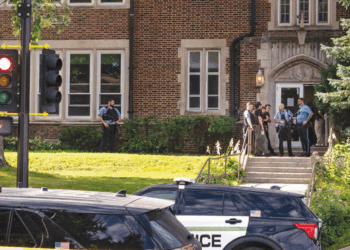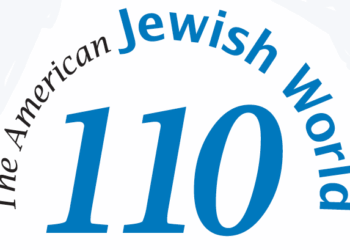The potholes in Twin Cities streets will get deeper and wider in the coming years. This was one conclusion reached by a lobbyist for municipal governments, after Gov. Tim Pawlenty unveiled his proposal on Monday to deal with a $1.2 billion state budget deficit.
In addition to $250 million in LGA (Local Government Assistance) cuts, which will force cities and counties to trim their budgets (for public safety, road repair, etc.), Pawlenty’s supplemental budget trims $347 million from health and human services programs. Among many organizations in the community, Jewish agencies will take a hit if these cuts are enacted into law.
Most notably, Sholom Community Alliance will be affected by Pawlenty’s suggested 2.5 percent decrease in reimbursement rates for long-term care providers. This funding cut comes on top of a 2.8 percent reimbursement decrease last year, according to Sarah VanWinkle, R.N., who directs Sholom Care, which provides on-site assistance to residents of the Sholom-run residences in St. Louis Park and St. Paul, and private duty home care to elderly clients.
VanWinkle is especially concerned about the effect of further cuts on the Elderly Waiver program.
“It’s a program set up to keep people out of the nursing home and in their own homes, or in subsidized housing, with services coming to them,” she told the Jewish World this week.
Those who qualify for the Elderly Waiver program “are the people at risk of nursing home placement — that’s how you qualify for it. You have to be over 65, you have to be on Medical Assistance and you have to be at risk of nursing home [placement].”
In fact, Pawlenty’s plan to ax social service programs means that home health care aides will lose their jobs.
“If the reimbursement rate does not pay for my staff, then I’m going to have to stop providing the service,” VanWinkle explained, and added that “these programs will have to close down, and there’s no nursing home beds for these people… because they’ve closed down all of these nursing home beds. I just think it’s almost a perfect storm.”
According to the governor’s 67-page supplemental budget proposal, the state will save $37 million in 2011, from the 2.5 percent cut in reimbursement rates to the long-term care providers. In 2012 and 2013, an additional $104 million of state funding will be cut in this area.
Sholom Community Alliance — the largest local Jewish-run agency, with a $41 million annual budget, in 2008 — stands to be the big loser in the Pawlently budget-balancing scheme, as far as the organized Jewish community in the Twin Cities is concerned.
But Ethan Roberts, director of the Twin Cities Jewish Community Government Affairs Program, said that Pawlenty’s proposed cuts “will absolutely impact” other agencies, including the St. Paul JCC, Jewish Family and Children’s Service of Minneapolis and Jewish Family Service of St. Paul. Kosher Meals on Wheels, case management services, medical translation and other Elderly Waiver programs would face retrenchment if the governor’s plan goes through.
“Most of what this money pays for is people,” Roberts notes, in regard to Pawlenty’s proposal. He estimates that 20 jobs would be lost, mainly Sholom employees; all of the Jewish organizations would lose about $350,000 in state funding.
And Roberts mentioned that Aging Services of Minnesota, the state’s largest association of aging services organizations, estimates that there will be 500 jobs lost throughout Minnesota as a consequence of budget cuts to long-term care providers.
In mulling over funding and jobs lost, we should consider the fact that those working for Elderly Waiver programs provide valuable human contact for many members of our community who are shut in. For those living in isolation, a smile and some moments of companionship mean a lot.
Apart from this grim outlook for our elderly citizens, there is a worse outcome looming. The governor’s budget balancing act counts on an infusion of $387 million from federal medical assistance, part of the jobs stimulus bill that is stuck in Congress. In legislative jargon, Pawlenty is counting on Minnesota benefiting from an increase in “FMAPs” — the Federal Medical Assistance Percentages, which are used in calculating federal matching funds for state spending on Medicaid and other social programs.
“If we don’t get this [$387 million in federal money] by the time the Legislature’s out, then I think we need to pull that piece back and reduce the state’s budget even further,” Pawlenty said, according to Politics in Minnesota. “That’s something we’re going to monitor very carefully.”
We should all monitor this budget process very carefully, and provide feedback to Gov. Pawlenty and our legislators. These are tough economic times that require making some difficult choices; but it invites cynicism when our government leaders decide to balance the books on the backs of the most needy and vulnerable among us.
And we should recall the words of the psalmist (71:9): “Do not cast me off in old age; when my strength fails, do not forsake me!”
— Mordecai Specktor /Â editor@ajwnews.com
(American Jewish World, 2.19.10)
Â



















